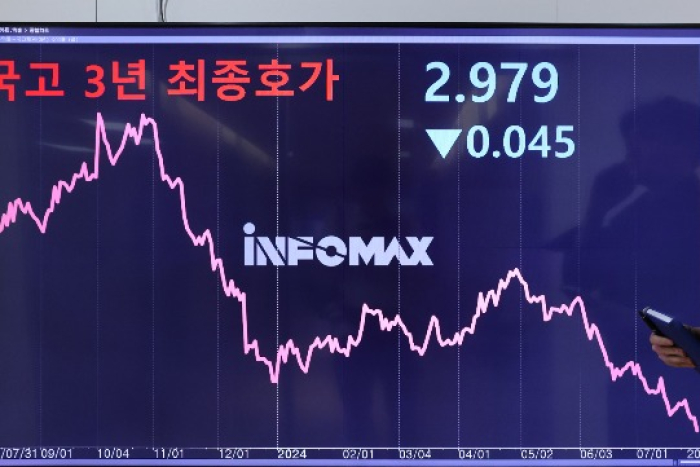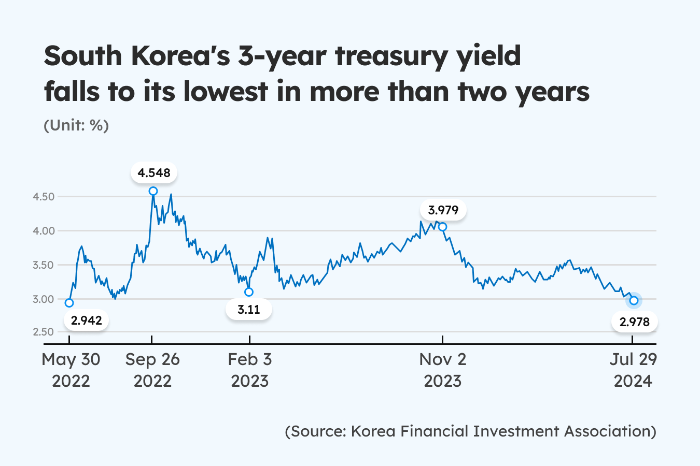Korean treasury yields fall to lowest level in over 2 years
Foreign investors have snapped up Korean treasuries in June and July in anticipation of rate cuts
By Jul 30, 2024 (Gmt+09:00)
Samsung steps up AR race with advanced microdisplay for smart glasses


When in S. Korea, it’s a ritual: Foreigners make stops at CU, GS25, 7-Eleven


Maybe Happy Ending: A robot love story that rewrote Broadway playbook


NPS yet to schedule external manager selection; PE firms’ fundraising woes deepen


US auto parts tariffs take effect; Korea avoids heavy hit



South Korea’s treasury bond yields fell to their lowest points in more than two years, slipping below the 3% level for the first time since April 2022 as the unexpected economic slowdown in Asia's 4th largest economy in the second quarter raised expectations of at least two rate cuts this year.
The yield on Korea’s benchmark three-year treasuries hit 2.978% at Monday's market close, down 0.046 percentage point compared with Friday’s finish. It marked the first time the treasury yield slid to the 2% level since May 30, 2022, when it touched 2.942%.
Five-year treasury yields also dropped to the 2% level for the first time since hitting 2.942% on April 1, 2022. The yield inched down 0.055 percentage point to close at 2.990% on Monday.
The government bond market has priced in two rate cuts of 25 basis points each within the year, after the Bank of Korea kept its base rate at 3.50% for 18 months straight as of this month.

Treasury yields have been spiraling downward since April, after hovering at the base rate of 3.50% between November 2023 and March of this year.
Foreign investors led the bond market rally. They've scooped up a net 4.2 trillion won ($3.0 billion) worth of Korean government bonds so far this month following their net purchase of 4.48 trillion won last month, according to the Korea Financial Investment Association.
KOREA'S ECONOMIC SLOWDOWN
The decline in domestic government bond yields tracked the US Treasury moves.
Traders are now quite certain about a US interest rate cut in September after data showed that US inflation eased in June. The yield on 10-year US Treasuries edged down 0.048 percentage point to 4.195% as of last weekend.
A slowdown in the Korean economy bolstered expectations that the country's central bank would follow suit with a rate cut in October. The country's gross domestic product contracted 0.2% in the second quarter from the quarter prior, snapping the five-quarter growth streak.
After the July rate meeting earlier this month, Bank of Korea Governor Rhee Chang-yong said it was time to prepare a rate cut as consumer prices were holding around the central bank's target of 2%.
But he remained cautious about the timing of a rate move, citing household debt growth, rising house prices and the softer Korean won.

UPGRADE TO DEVELOPED MARKET STATUS?
Some bond analysts said the domestic bond market rally seemed to reflect foreign investors’ bets on a long-awaited reclassification of Korea into developed bond market status.
In March, FTSE Russell, the global index subsidiary of the London Stock Exchange Group, kept Korea on its watch list for potential inclusion in its FTSE World Government Bond Index (WGBI).
However, a BOK official warned the bond market was overshot.
“Considering the views among monetary policy board members, market expectations [for an imminent rate cut] were overdone,” said the official. “There are many variables that could play against market expectations.”
Ahn Jae-kyun, a fixed-income strategist at Shinhan Investment & Securities, said that a rise in public service prices due for the second half of this year would add to inflationary pressure and thus, the fall in treasury bond yields below 2% would be short-lived.
“Korean bond dealers don’t feel like buying three-year treasuries below 3.1%,” said a fixed-income trader. “It looks like only foreigners are buying [Korean] treasuries.”
On Tuesday, the three-year treasury yield closed morning trading at 2.988%, up 0.010 percentage point from Monday's finish.
The yield on five-year treasury notes added 0.009 percentage point to reach 2.999% by midday.
Write to Jin-Gyu Kang and Hyun-Il Lee at joseph@hankyung.com
Yeonhee Kim edited this article
-

-
 EconomyKorean banks raise mortgage rates despite looming rate cut
EconomyKorean banks raise mortgage rates despite looming rate cutJul 17, 2024 (Gmt+09:00)
2 Min read -
 Central bankBOK chief signals rate cut; warns of rising housing prices
Central bankBOK chief signals rate cut; warns of rising housing pricesJul 11, 2024 (Gmt+09:00)
3 Min read -
 Foreign exchangeWon to soften past 1,400, BOK rate cut likely in Oct: poll
Foreign exchangeWon to soften past 1,400, BOK rate cut likely in Oct: pollJul 10, 2024 (Gmt+09:00)
4 Min read -
 Central bankBOK sees more uncertainty in rate cut timing, ups growth forecast
Central bankBOK sees more uncertainty in rate cut timing, ups growth forecastMay 23, 2024 (Gmt+09:00)
3 Min read -
 EconomyKorea’s household debt growth at 5-month high on mortgages
EconomyKorea’s household debt growth at 5-month high on mortgagesMay 13, 2024 (Gmt+09:00)
2 Min read -
 Sovereign bondsFed rate cut hopes spur Koreans’ US Treasury bond buying spree
Sovereign bondsFed rate cut hopes spur Koreans’ US Treasury bond buying spreeFeb 16, 2024 (Gmt+09:00)
1 Min read -

-
 EconomyTreasury yield falls signal BOK's looser grip on inflation
EconomyTreasury yield falls signal BOK's looser grip on inflationFeb 13, 2023 (Gmt+09:00)
3 Min read -
 EconomyS.Korea exempts foreign investors from treasury bond tax
EconomyS.Korea exempts foreign investors from treasury bond taxOct 17, 2022 (Gmt+09:00)
2 Min read


